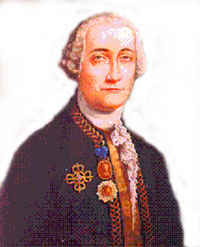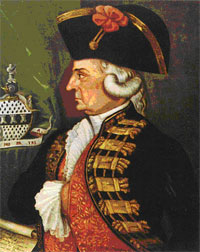Wall's Party
Together with
the more quotidian anecdotes, one of the most important
research topics for historians is the political and courtesan
network that supported Wall before his undertaking of the
ministry and after his appointment. The dialectics of
confrontation between the different political and courtesan
groups that dominated the political scene in these decades is
an exciting subject. With regard to this, we find Ricardo Wall
playing a central role in the Marquis de la Ensenada's
exoneration (1754) and leading a new party.
[14]
|

Alejandro O'Reilly |
The later
attempt at consolidation of the new emergent group was
conditioned by political struggles in the Spanish Court. The
Duke of Huéscar was a powerful figure until 1757 and he was
behind a number of governmental measures. On the other hand,
there were other important politicians leading the opposition
party: Mr. Eslava y Mr. Campo del Villar. They assumed the
leadership of the Ensenadist party, supported also by
the French ambassador, the Marquis d'Ossun, and other
courtesans, after the end of Ensenada's exile. In this
context, I have paid more attention to the role of the Vatican
conspiracies against Wall, due to the controversies prompted
by the approval of the Pragmatic Sanction. Wall's retirement
in 1763 must be linked with these intrigues, but not
exclusively, as I will explain in detail. There were other
factors, such as personality and health problems. In fact, in
1757, he attempted his first resignation.
In spite of
this last resignation in 1763, Wall's nine years leading the
Spanish administration left an important legacy that has been
underrated until the present day. His political and courtesan
party was successful after his retirement. Several factions
were born from this common root and were influential during
the rest of the reign of Charles III. The 'Aragonese Party',
led by the Count of Aranda, and the 'Manteísta' group, led by
the Counts of Campomanes and Floridablanca,
[15] were the most
important. In fact, Wall was the 'discoverer' and protector of
the most relevant protagonists of the subsequent decades: Roda,
Campomanes, Aranda and Grimaldi. The identification of the
members of an Irish party, led by Wall, was also a significant
development. This group basically agreed with the 'network of
Jacobite solidarity' described by Ozanam and whose vitality is
fundamental in this period.
[16]
|

Ambrosio O'Higgins |
Some of the
members of this Irish party were ambassadors: Count Mahony was
appointed ambassador, first in Switzerland (1757), and in
Vienna shortly afterwards (1758). The Count of Lacy was
appointed ambassador in Stockholm (1763). Some others were
soldiers, such as Alejandro O'Reilly, Eduardo Wall, Agustín
Wall and Juan Kelly, or merchants such Carlos McCarthy and
Ambrosio O'Higgins. There were Irishmen sponsored by Wall in
the administration (Bernardo Ward and Diego Nangle) and in the
Royal House (Doctor Diego Purcell).
[17]
However the
composition of Wall's party is much more complex.
Heterogeneity is the key factor. On the one hand, the
inheritance of his protectors, Huéscar and Carvajal, was
clear: Masones of Lima, the Count of Peralada, Mr. Clemente de
Aróstegui, Count of Valparaíso and Mr. Felix de Abreu. Wall
also protected other colleagues (Arriaga), the 'Aragonese
Party' of the Count of Aranda, the Count of Ricla and the
Count of Fuentes, 'Manteístas' like Campomanes or Roda, the
Irish Party, Italian and Flemish people (the Prince of
Masserano, the Marquis of Grimaldi, the Count of Bournonville,
Sterllinguerf, Craywinckel, Goosens and Winthuyssen),
counsellors (Cantos, Ric), officers in the secretariats
(Nicholas de Mollinedo, Jose Agustín of Llano and Francisco de
Auzmendi), intellectuals (Guillermo Bowles, Jose Clavijo y
Fajardo, Celestino Mutis, Benito Bails and Francisco Perez
Bayer), and relatives (Eduardo and Agustín Wall). |



